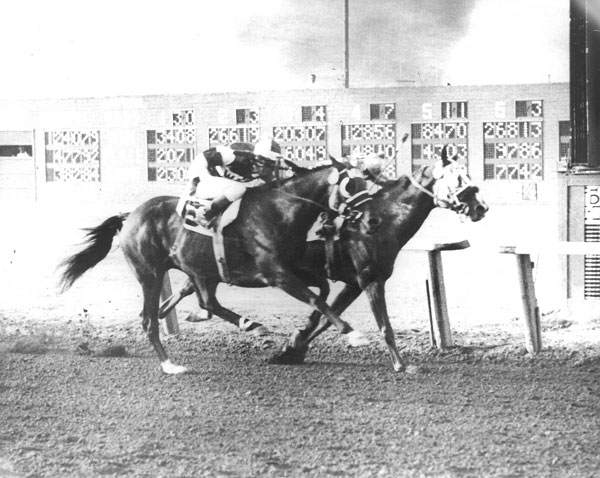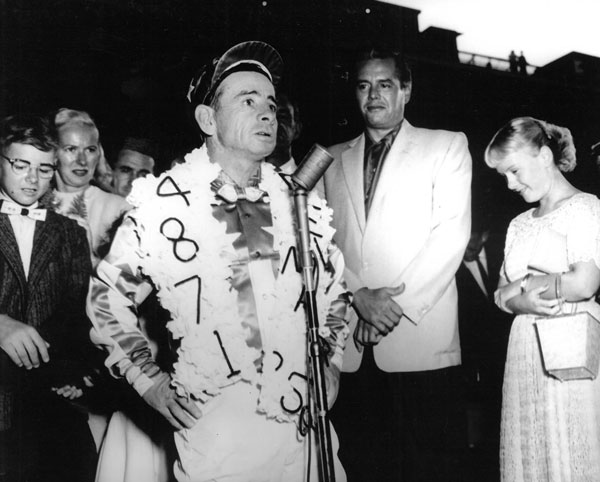
Arrogate (inside) and John Longden win the 1956 Del Mar Handicap to make the rider the winningest jockey in the world.
by Hank Wesch
Arrogate, the consensus best horse in the world in 2017, ends a four-month break from competition Saturday in the $300,000 TVG San Diego Handicap at Del Mar. The 4-year-old son of Unbridled’s Song will put on the line a seven-race winning streak, the last three in stakes with purses of $6 million, $12 million and $10 million to build a bankroll of more than $17 million from just eight career starts.
He’s enough to make officials of the track that will host the 2017 Breeders’ Cup thank their lucky stars for being on his campaign trail – the $1 million TVG Pacific Classic in August and $6 million Breeders’ Cup are other likely Arrogate showings at Del Mar. Enough to bring the eyes of racing fans and attention from the general public to Del Mar every time Arrogate runs.
But, for the record, Arrogate 2017 is not the first Arrogate to stir things up in a major way at the picturesque track by the sea.
On September 3, 1956, Labor Day, legendary jockey John Longden booted home a horse named Arrogate in the Del Mar Handicap. It was career victory No. 4,871 for Longden, making him the winningest rider of all time, surpassing Sir Gordon Richards of England.
It was a grand moment in the career of Longden, who had ridden for 30 years at that time and was dealing with arthritis in his shoulders, elbows and knees. It also was a memorable moment in the history of Del Mar, especially when coupled with one 14 years later. On September 7, 1970, another Labor Day, Bill Shoemaker rode a filly named Dares J to career victory No. 6,033, surpassing Longden on the all-time wins list. Longden was there to greet “The Shoe” in the winner’s circle.
But we digress. Back to Arrogate.
The original Arrogate was a foal of 1951, a son of Goya II out of the Stimulus mare Hug Again. He was bred by the storied Calumet Farm in Kentucky, racing under the Calumet colors for the first 2 ½ years of his career. Then he was acquired by Mr. and Mrs. Dick Griegorian for whom he competed for the next 4 ½ years and was trained by Reggie Cornell.
A chestnut colt, unlike his gray latter-day namesake, original Arrogate campaigned for seven years, 1953-59, won 20 races from 83 starts and finished in-the-money another 22 times. His career earnings of $226,545, factoring in inflation, would translate to more than $2 million in 2017 dollars. Not current-day Arrogate kind of money, but certainly not bad.
Original Arrogate’s best years were 1955, 1956 and 1958 when his annual earnings totals were $64,800, $60,540 and $25,900, respectively. Arrogate won three stakes in both 1955 and 1956, accounting for six of his nine career stakes triumphs. He won three stakes at Del Mar, the 1955 Escondido Optional Claiming Handicap and the 1955 and 1956 Del Mar Handicap.
In the 1955 ‘Cap, Arrogate established good position soon after the start from the No. 6 post in a field of nine, right behind front-running Bobby Brocato. Longden had his horse well in hand to the second turn, then subjected Arrogate to what the official chart called “vigorous handling in the drive” to edge Bobby Brocato and jockey George Taniguchi by a nose.
The time, 1:47 2/5, equaled the track record.
The race favorite, coupled in the betting with seventh-place finisher Turk’s Delight, Arrogate paid $5.20 $2.60 and $2.30.
Arrogate drew the No. 2 post position for the 1956 Handicap and tracked from fourth in a field of nine for the first six furlongs of the 1 1/8-mile race. The charts point out that Longden had Arrogate well in hand while saving ground through three quarters. Then “moved up thereafter on the outside, wore down Poona II approaching the final eighth and stalled off Honey’s Alibi to make his rider the new jockey champion of the world.”

John Longden addresses the crowd in the winner’s circle at Del Mar in 1956 after winning the Del Mar Handicap aboard Arrogate.
The margin, again, was a nose. The time, 1:47 flat, established a Del Mar record.
Arrogate raced for Calumet until the 1955 summer meeting at Hollywood Park when the Griegorians took over. Racing publications often referred to Arrogate as a “Calumet castoff” in chronicling the successes that followed.
“Trainer Reggie Cornell has made something of a specialty of taking bad-legged horses from Calumet Farm at private treaty and making them pay their way for various clients,” the Thoroughbred of California Magazine noted of the 1956 season. “Arrogate is just one more in an extensive list.”
Hall of Fame trainer Ron McAnally – here at Del Mar again this summer for the 61st time -- worked for his uncle Reggie Cornell in those days and had memories of Griegorian, described as a “refuse entrepreneur,” along with Arrogate, that he shared with the Daily Racing Form’s Jay Hovdey for a column last September.
“What a business Griegorian had,” McAnally said. “After his trucks picked up all the trash, he’d have it all separated into bottles, cans, paper and garbage. The bottles, cans and paper he’d sell and the garbage they’d take to a pig yard to feed the pigs. And they were his pigs! Every part of the operation was profit.”
On Arrogate: “Ideal to work with. No problems at all,” McAnally recalled.
If there was a reason that Calumet named the horse Arrogate, it has likely been lost in time. Bob Baffert, trainer of the 2017 Arrogate model, said he didn’t know how the name for his current star came about.
The Jockey Club naming rules prohibit the reuse of a name of a truly famous horse -- for example, a Horse of the Year, an Eclipse Award winner, a Triple Crown race winner. Since the original Arrogate was none of those, the moniker became available under their rules as of 1964. Prince Khalid Abdullah’s Juddmonte Farms opted for it four years ago.
The dictionary defines arrogate as: “to claim without justification.”
Hardly fitting for either the original or the new Arrogate who, then and now, justly recorded major accomplishments. Especially at Del Mar.
